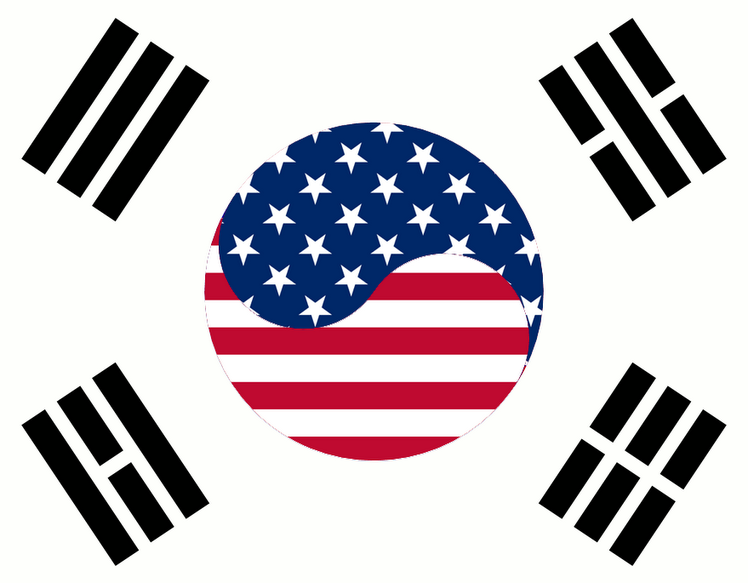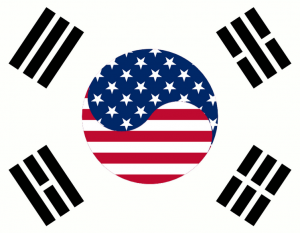My Korean-ness – The Other Half of Me (Part 2)
9 min read
 It’s difficult growing up in a multicultural home. It isn’t difficult for the reasons that one would assume either. For instance, having a Korean mother didn’t mean that culture clashes would happen with other members of the family just because there were language barriers or because there would be different tastes in food. Believe it or not, simply getting yelled at wasn’t necessarily a bad thing in and of itself. There are subtleties that exist that go much deeper than an outsider’s perception of what appears confrontational and what actually is confrontational. So, the real difficulty in living in a multi-cultured home exists because sooner or later it means that there are going to be clashes in values that are so deeply seeded within us that they are hard to explain and even harder to break free from without a deeper understanding about words like duty or honor. Coincidentally these are not just words that loosely fly out of patriotic manifestos. These are words that in some cultures completely envelop societies. It makes understanding why matriarchal and patriarchal societies tick all the more complicated to understand without a degree in anthropology or abnormal psychology anyway.
It’s difficult growing up in a multicultural home. It isn’t difficult for the reasons that one would assume either. For instance, having a Korean mother didn’t mean that culture clashes would happen with other members of the family just because there were language barriers or because there would be different tastes in food. Believe it or not, simply getting yelled at wasn’t necessarily a bad thing in and of itself. There are subtleties that exist that go much deeper than an outsider’s perception of what appears confrontational and what actually is confrontational. So, the real difficulty in living in a multi-cultured home exists because sooner or later it means that there are going to be clashes in values that are so deeply seeded within us that they are hard to explain and even harder to break free from without a deeper understanding about words like duty or honor. Coincidentally these are not just words that loosely fly out of patriotic manifestos. These are words that in some cultures completely envelop societies. It makes understanding why matriarchal and patriarchal societies tick all the more complicated to understand without a degree in anthropology or abnormal psychology anyway.
“White people are dirty. They wear shoes in the house. Same shoes they wear to bathroom at work. Then they bring home germs. Walk all over house. Dirty!” My mother would say as if “Americans” literally lived in outhouses dragging mounds of manure into their homes without thinking twice about it.
“You don’t know that.” I would respond.
“Oh yes, I know. I see them. I know.” She would say.
“So you’re in the business of smelling shoes?” I would ask.
“Oh, I know what shoes smell like. Stinky.” My mother would reply as she would eat her kimchee soup. Our home would often permeate with the smells of kimchee or some other heavily red pasty flavored concoctions that was often boiled to bring out its flavor. These are the smells that would overwhelm me as I opened the door when coming home. These are the smells that one could imagine most closely resembled what a spicy sock would smell like – if one had to imagine what it would be like to cook a sock. Strangely these are also the smells that I actually miss when I think back on my childhood.
I suppose, in the purest sense, we are all multi-cultured. But in the most practical sense, most Americans lose their “culture” within a few generations. It doesn’t mean that they don’t care about where they came from or who they are, but they really do lose a sense of what it means to be a hyphenate like Polish-American or Italian-American etc in the most immigrant sense. It may be one of the reasons, at least in part, that we cling to things like political parties, religion or sports franchises to help us with a sense of identity and a sense of belonging to something that is bigger than us. At least in part these are things that can act as sufficient substitutes as they all can give one a sense of belonging to regions, to ideals and to value systems of our choosing. I would go so far as to say that we need these things to feel like we’re grounded and capable of bonding to our fellow humans because there are likely natural tendencies within humanity to place things into groups of associations in order to make sense of our lives. As long as we all long to belong to something that reminds us of who we are and where we come from we feel like we’re bigger than we are as a singular entity.
I find it funny that I spent most of my life missing the idea that I too would have this need to rediscover who I am as well. I would often see other people gravitate towards this desire to chase after this meaning when people have the sudden yearning to rediscover their roots. For many in this country it means discovering a loose history of grandparents or great grandparents who vaguely remember that this great aunt or that great grandfather came from someplace far away and settled in this country to give their children a chance at a better life not realizing the ramifications of losing one’s heritage within a hundred years or so only to have their great great grandchildren embracing 1/16 of their heritage as though they were entirely Greek, Spanish or Cherokee Indian. I believe we need to know that we must have come from somewhere in order to make what happens now mean something more to us. For me this need would come after marriage. And my rediscovery of my Korean-ness would mean as much to me as it would mean for my friends would never knew their European ancestors at all.
I am surprised that I’m still married. It’s in reflecting upon all of these things that I still remember the first time I apologized to my wife about growing up in a Korean home and essentially identifying with being more Korean than Caucasian. This wasn’t something that I was prepared to admit since I was always under the assumption that growing up in America meant that I was an American first. But it was shortly after my wife and I started getting into our own conflicts that involved my mother (or her Korean mother in law if you are seeing this from her point of view) that I started to first understand the complexity of growing up the way I did. You see, I was always under the presumption having grown up in America (and having mostly American men in my life acting as fathers) that I was somewhere in the middle of that melting pot ideal. I thought it was reasonable to assume this as I was fairly in the middle of cultures in terms of my understanding of what it means to be a part of a blended family. Even if kimchee were a partial staple, we also had pancake breakfasts, ate barbeque chicken, ate ice cream for dessert and even watched Jeopardy in the evenings. So what if I would eat sea weed, kimchee and even squid? It couldn’t be any less appealing that ratatouille, right?
I am surprised I’m still married not for the food, but how food relates to this story. Like kimchee, the Korean culture that I was exposed to as a young person seems to permeate through everything I do and how I continue relate to the world around me. I am not Korean because of my mother’s cooking, but I am because of how I perceive how anything cooked with garlic seems to linger inside of you for days after eating anything cooked with it. That’s the sort of unseen and under noticed idea that I’m talking about that would cause me to side with my mother every time she barked orders at my wife. I did this not because I don’t love my wife, but because a dutiful son would side with his mother and gently encourage his wife to listen to her.
“Your mom is so mean!” My wife would say.
And while I would agree that she was mean to her daughter in law, I could see how they would continue to clash as people that could not stand to smell one another. A disdain for kimchee that seems to taste better to me the more it sours could only be tolerated by my wife it were fresh. Unfortunately, my wife never knew what her mother in law was like “fresh.” She only got to experience her as a person who had soured. And yes, as a person that was mostly mean to her. That would be the person that would yell and scream at her for not calling her “mother”- even if I tried to explain how Asian cultures were different and how she married into an Asian family – my wife would never have that Asian-ness permeate through her the way it would me. She would miss how this would all relate and simply see these things from a distance and only from a perspective that would scratch its head at why Koreans could never extricate behavior from the inside out. It’s not a culture about “feelings.” It’s a culture about appearances.
“It’s a sign of respect, honey. You must call her mother.” I would explain. “It would be an insult to her culture if you didn’t.”
My wife often reluctantly complied. Over and over her Korean mother in law would make a demand. And she would comply. She would comply over and over again no matter how crazy the demand seemed “She’s demanding that I wash the dishes in only cold water,” “not wash my clothes too much,” “hang the wet clothes on a clothes line,” “put dry clothes in the dryer,” “clean all the floors before I go to work,” “clean the floors when I get home from work,” “collect the clothes on the clothes line after work,” “not go on any more vacations to see my parents,” “not leave the house unless it’s for work,” “only use Dove soap,” “only buy Tide soap,” “tie my hair back before entering the house or the children might choke to death on a stray hair that might have fallen off my body into their food,” “work more,” “work less,” and “flush the toilet paper down the toilet, but only if I’ve pooped…otherwise use the trash next to the toilet!” “Honey, she’s driving me crazy!” She would scream.
I am surprised that I am still married. Even as I reflect on the person that my wife was exposed who had soured, even as I reflect on the mother that exploded out of her bedroom throwing a box of pills at my wife screaming and demanding that she move out because she had long ago disrespected her. My mother would never forgive my wife for any of the wrongs committed against her. I’m not sure that even I will ever understand why? Maybe it’s for the same baffling reasons that Koreans gravitate towards their evening melodramas that play comedy and tragedy as if they are one and the same. I see my life similarly. Happy that I have found love and unhappy that this love cannot be shared or extended beyond my marriage. Maybe Korean mothers cannot love their daughter in laws. Their demands are just too great and life is just too short. But as I get older, I am convinced that Korean mothers, much like kimchee sour. And sour kimchee can only be an acquired taste that maybe only sons can appreciate. Maybe.
“Your mother is so mean. And I was never a daughter to her. She never loved me.” My wife will occasionally tell me. I cannot disagree. My Korean side still believes that maybe it was still a total lack of understanding the culture or a woman who was most likely forced to fight to survive a tough existence and cannot relate to the rest of the world except through violence. I continue to blame my grandfather for this even though we have not seen him for years and even though he passed away without any of his children very close to him. I know that the beginning of love and hate begins and ends with him. My wife never got to meet him. Her memories of her mother in law will forever be left with the outbursts of angry words, finger pointing and things being thrown at her. That is a part of my Korean-ness that I must always apologize.
I remember my mother as different person she was all of these things I have told you, true. But the woman I remember still had much of her life ahead of her. The one that heroically came to this country with her daughter and the one that sat in her little car weeping as she struggled to take care of me with her low paying factory job. This is the woman I cannot forget even after all of the angry words and temper tantrums. I remember the woman that, after being rejected from a rundown apartment complex that did not believe we had the means to afford even their low standards, wept.
“I can make it.” She wept, turning to me, holding my hand and trying to be brave. “We can make it.” It’s those words I remember and they give me strength because who I am is who she was. It still permeates out of me as I think about my marriage, my children and our future. I cannot extract myself from my Korean-ness. I can only believe what I remember from that day that my mother and I were at our lowest…nearly homeless and wondering if we would have a place to live. “We can make it.” We can.






